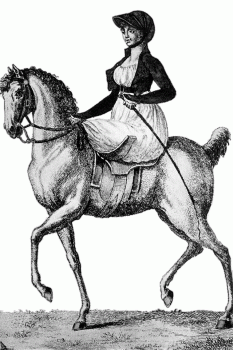Tag: reading
Friendly voices
27 April 2015 | Letter from the Editors
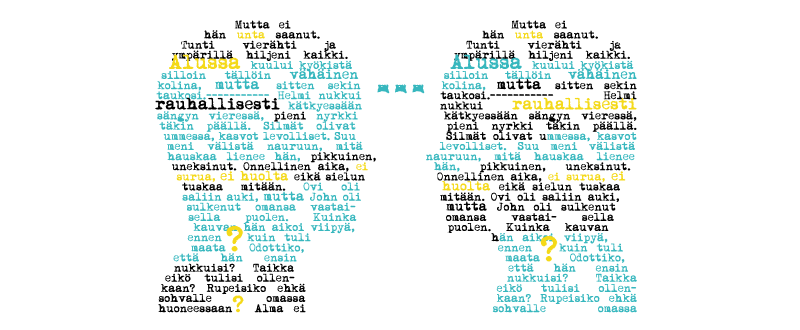
No one could call reading – or writing, for that matter – a social activity. No matter how many reading, or writing, groups you may choose to join, the actual engagement with a book is something you do alone.
Music, theatre, cinema, dance – those really are social enterprises. You can go to them together; you can watch them together, at the same time; you can talk about the experience you’ve shared. Even computer games, which sometimes seem to their elders to be making solipsists of all our children, are social, even if the ‘friends’ they play with may be the other side of the world, and may not speak the same language.
You’re never alone with a good book, as the advertising slogan says. But you’re not exactly in company, either… except…. More…
The coder’s Latin
30 October 2014 | Articles, Non-fiction

Pleasant interface still? Old book bindings (Merton College library, Oxford, UK). Photo: Wikipedia
Writing is arguably brain-control technology, notes our columnist Teemu Manninen. Writing might not be on its way out, at least not quite yet, he thinks, but the printed book might not stay with us for ever. And would that be a happier world?
When the future of literature is discussed, either here in Finland and elsewhere, topics usually revolve around changes in the economics and practicalities of reading, writing, and publishing: how will writers and publishers get paid, and how can readers find more books to read.
What is taken for granted in these instances is that literature itself will continue to be something that exists in a recognisable way – which itself of course implies that writing itself will remain a viable mass medium for the transmission of information over the transcendent, enormous, unfathomable gulfs of space and time, as it has been for thousands of years. More…
Instant erudition, or, who are you kidding?
2 September 2014 | Articles, Letter from the Editors, Non-fiction
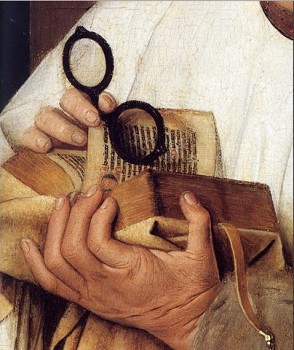
Time to read? Detail from Madonna with Canon van der Paele by Jan van Eyck (1439. The Groeninge Museum, Brugge). Wikipedia
In a recent ‘Saturday essay’ in the Helsingin Sanomat newspaper (9 August) journalist Oskari Onninen ponders the moral dilemma of pretending to be erudite. For example, who has the time to read books these days? ‘The Woolfs remain unread, Bergmans unwatched’, Onninen writes.
Our consumerist lifestyle forces us to follow the trends of ever-expanding, multiplying forms of entertainment. However, it is apparent that the need to know about culture in order to pass as a cultured, well-informed citizen still exists, to some extent at least.
According to Onninen, there is less and less time for unproductivity. ‘If one looks for measurable cost-benefit results from the reading of heavyweight fiction, the act of reading will certainly not always be worthwhile.’ Consuming art (reading books, going to art exhibitions, watching plays) requires time and effort, and how productive is that? More…
Kirja muuttuvassa tietoympäristössä [The book in a changing information environment]
21 August 2014 | Mini reviews, Reviews
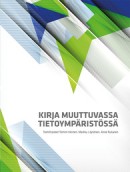 Toim. [Ed. by] Markku Löytönen, Tommi Inkinen, Anne Rutanen
Toim. [Ed. by] Markku Löytönen, Tommi Inkinen, Anne Rutanen
Helsinki: Suomen tietokirjailijat ry. [The Finnish Association of Non-Fiction Writers], 195 p., ill.
ISBN 978-952-67356-3-4
paperback; available also online:
http://www.suomentietokirjailijat.fi/jasenyys/julkaisut/kirja-muuttuvassa-tietoymparisto/
In the Western world the experience of reading is undergoing a critical change. There is even talk of a third information revolution. Books are increasingly acquiring electronic form, and the future of the printed book is being called into question. Kirja muuttuvassa tietoympäristössä contains the considered opinions of 18 experts on what is taking place in the field of non-fiction, and gives an overview of the literature on the current situation, which is seen from the point of view of the bookstore, the library, the author and the publisher. There is a discussion of intellectual property issues, developments in technology, and changes in the use of teaching materials, language, and reading habits. Finland is a leading country in both literacy and reading. The number of books has slowly declined in recent years, but it seems that the country’s youth has maintained an interest in books, and in fiction in particular. Although printed reference works of the encyclopedia type have given way to the information provided by the Internet, it is likely that literature and reading will preserve their status as a part of human culture.
Translated by David McDuff
Beautiful books
15 May 2014 | Letter from the Editors, Non-fiction
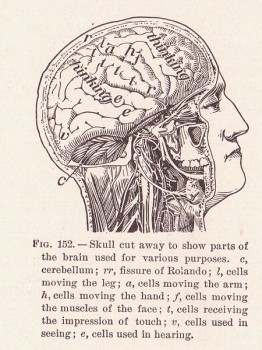
Brains at work. (Alvin Davison, ‘The Human Body and Health’, 1908) Wikimedia
A precise translation of the word non-fiction doesn’t exist in the Finnish language. Fiction is kaunokirjallisuus (a word invented by two diligent scholars, D.E.D. Europaeus and A. Varelius in mid-19th century for their Swedish-Finnish dictionary) – and a pretty word it is: kauno- is derived from the word kaunis, beautiful, beauteous. Non-fiction translates as tietokirjallisuus: literally, ‘literature of knowledge’.
Recently the status of Finnish non-fiction has been discussed in various media. Authors of non-fiction, as well as a number of readers, have been worried about diminishing sales, a decline in interest among both the general public and publishers, a lack of professional publishers’ editors. In a small-language area producing and profitable publishing ‘literature of knowledge’ is financially hard. More…
Kynällä kyntäjät. Kansan kirjallistuminen 1800-luvun Suomessa [Ploughers with a pen. The development of literacy in nineteenth-century Finland]
15 May 2014 | Mini reviews, Reviews
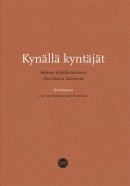 Kynällä kyntäjät. Kansan kirjallistuminen 1800-luvun Suomessa
Kynällä kyntäjät. Kansan kirjallistuminen 1800-luvun Suomessa
[Ploughers with a pen. The development of literacy in nineteenth-century Finland]
Toimittajat [Editors]: Lea Laitinen & Kati Mikkola
Helsinki: Finnish Literature Society, 2013. 558 pp., ill.
ISBN 978-952-222-453-8
€42, paperback
This multidisciplinary work by thirteen researchers discusses the writings of self-taught people in the 19th century. In their own communities these Finnish-language amateur authors were exceptions to the norm, but viewed in the context of the Finnish nation as a whole there were more of them than there were authors belonging to the educated classes. The principal aim is to examine how the common people saw the social and cultural phenomena which the educated classes saw from their own perspective. Kynällä kyntäjät provides a background to the research of the subject and the spread of writing ability, presenting diaries, biographies, letters, rural poetry published in newspapers, broadside ballads, plays, short stories, collections of folklore and handwritten journals, as well as focusing on the mental and linguistic changes related to the development of literacy. The book opens up a new and fascinating perspective on the 19th-century world of ideas.
Translated by David McDuff
In praise of idleness (and fun)
21 December 2012 | Letter from the Editors
As the days grow shorter, here in the far north, and we celebrate the midwinter solstice, Christmas and the New Year, everything begins to wind down. Even here in Helsinki, the sun barely seems to struggle over the horizon; and the raw cold of the viima wind from the Baltic makes our thoughts turn inward, to cosy evenings at home, engaging in the traditional activities of baking, making handicrafts, reading, lying on the sofa and eating to excess.
It is a time to turn to the inner self, to feed the imagination, to turn one’s back on the world of effort and achievement. To light a candle and perhaps do absolutely nothing – which can in itself be a form of meditation.
That’s what we at Books from Finland will be trying to do, anyway. Support in our endeavour comes from an unlikely quarter. In 1932 the British philosopher Bertrand Russell published an essay entitled ‘In Praise of Idleness’, in which he argued cogently for a four-hour working day. ‘I think that there is far too much work done in the world,’ he wrote; ‘that immense harm is caused by the belief that work is virtuous’.
Russell was no slouch, as his list of publications alone shows. But his argument was a serious one, and we mean to put it into practice, at least over the twelve days of Christmas. ‘The road to happiness and prosperity,’ he wrote, ‘lies in an organised diminution of work.’ More…
Slow down!
26 August 2011 | Letter from the Editors
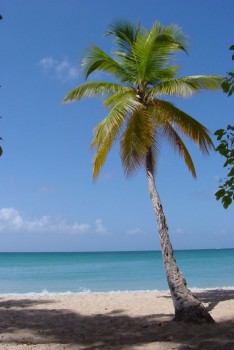
Books for a desert island? Photo: Patrick Verdier (Wikimedia)
Might Tolstoy’s War and Peace be the epitome of a novel that qualifies for reading on a desert island? (Maybe along with Tristram Shandy or Finnegan’s Wake, and possibly The Gateless Gate (the Zen Buddhist kōans). After all, who’s got time or energy for some 1,500 pages of a wartime story from the Napoleonic era with too many characters (580, and so many of them called Pierre)?
We do tend to consume everything quickly: busy busy! We eat fast, we talk fast, we exercise fast, we fast-forward through movies. We devour books like fast food. Hurry hurry! On to the next one, whatever it is, don’t hang about! More…
On reading, books and horses
4 June 2010 | Articles, Non-fiction
Horses, women, cars, men and reading: Teemu Manninen takes a look at the changes that illogical history makes
I have a friend who is an avid reader and who also talks about the books he reads. But being a staunch conservative when it comes to reading habits, I just cannot consider him a true friend of literature. The reason: he only reads non-fiction books. To me, ‘being a reader’ means reading fiction and poetry.
But increasingly it seems that real literature is becoming more and more marginal, whereas non-fiction (self-help, history, travel guides, popular science, popular economics, cookbooks) is what sells and keeps the industry afloat. The recent Finnish ‘essay-boom’ is an example of this development, with young writers like Antti Nylén or Timo Hännikäinen gaining recognition as important contemporary authors solely through their work as essayists; Hännikäinen has also written poetry, but Nylén is strictly a non-fiction writer. More…

